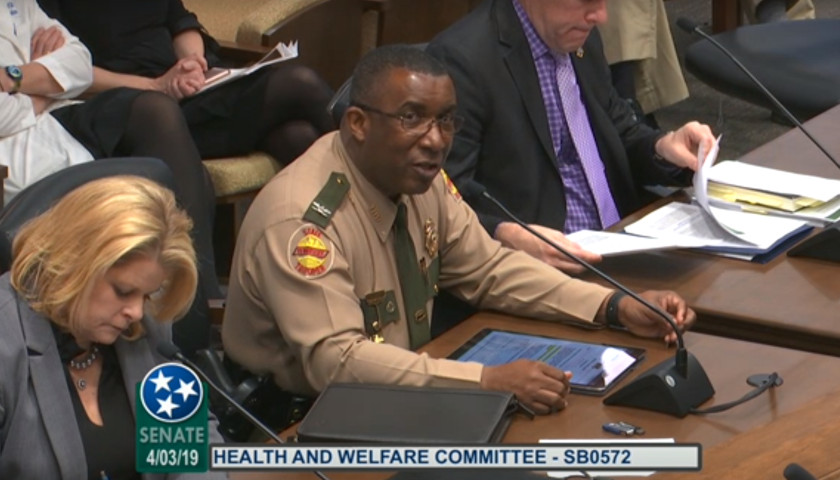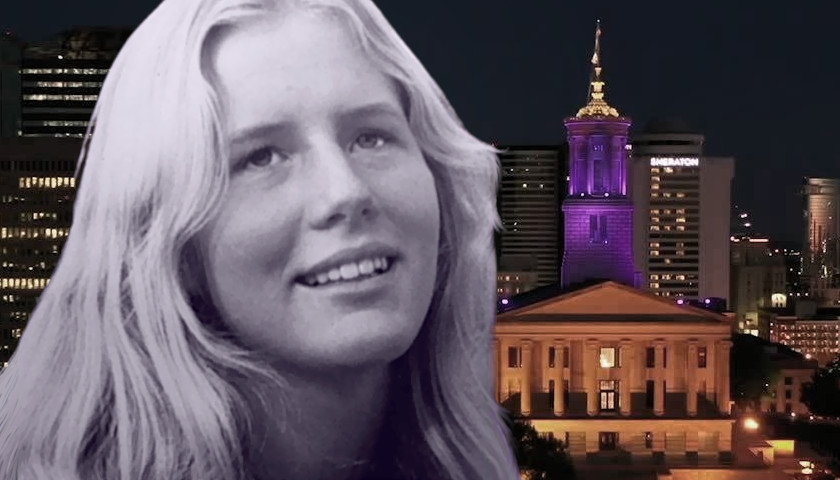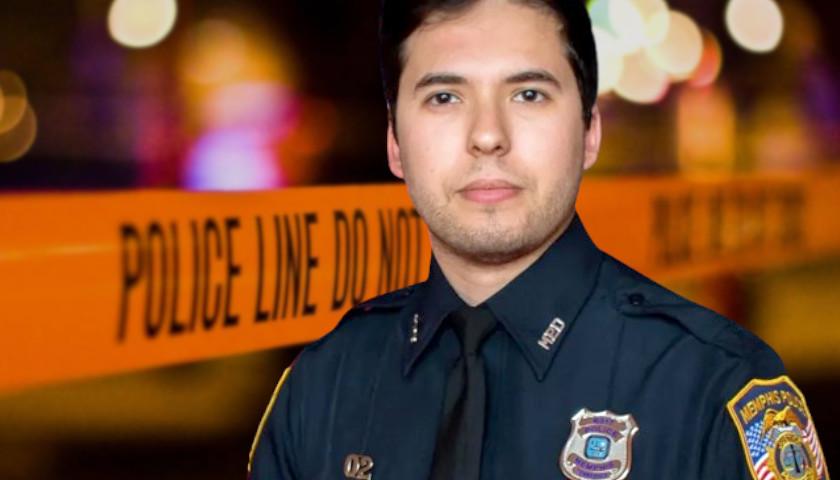State Sen. Janice Bowling (R-Tullahoma) on Thursday shared her continued support for allowing medical marijuana after a vote was postponed.
The vote was delayed after Wednesday’s hearing in the Senate Health and Welfare Committee, WJHL said.
Bowling, of Tullahoma, is a co-sponsor of SB0486, the Tennessee Medical Cannabis Act. The bill’s tracking information is available here. The bill will next be heard on Wednesday, April 10.
Bowling made her statement of support after law enforcement officers testified against the bill in the committee.
The senator said the bill would be dispensed as an oil and would provide for an alternative to opioids and would be monitored under a physician’s and pharmacist’s care.
“This legislation is about arming doctors and patients with an effective tool to treat a range of medical conditions and increase Tennesseans’ quality of life to successfully manage pain without the use of opioids,” Bowling said in a press release. “Opioids are highly addictive and are deadly. We were not in the committee yesterday to talk about the marijuana industry. We were there to present a bill on medical cannabis that will bring positive, life-altering treatment to people who are suffering. For them to conflict and conflate the two different issues and then to accuse lawmakers who support this bill of being untruthful, is disingenuous and inaccurate.”
Not everyone agrees.
WKRN quoted David Rausch, director of the Tennessee Bureau of Investigation, who opposed the legislation during the committee hearing.
“They want to legalize a highly addictive, dangerous drug for people to get high,” Rausch said. “This is not about medicine.”
He said legalizing medical marijuana would create a gray market, meaning it would be grown legally here but sold illegally in other states.
Another skeptic is Steve Gill, political editor of The Tennessee Star.
“Senator Bowling and others have legitimate concerns and interest in finding options other than highly addictive opioids to deal with a wide range of medical issues, but I would hope they would be cautious about being used by those who have a primary desire to promote the legalization of recreational marijuana and who are using children and medical claims as cover for their true intent,” Gill said.
“Colorado legalized high THC ‘medical marijuana’ and saw doctors distribute the prescriptions with reckless abandon to ‘patients’ who were more interested in getting high than getting legitimate medical benefits; and soon they adopted recreational marijuana that has caused serious problems for the state. The same doctors who have failed to limit the distribution of opioids are not likely to show more restraint with medical marijuana. There are low THC CBD oils and other cannabis products available that can provide huge benefits to those with serious medical issues and that do not include the “high” that is the actual desire of so many so-called patients. Those products should be the focus or our “medical marijuana” efforts at this point rather than being a willing or unknowing party to those who are actually pushing a different — and hidden — agenda.”
As evidence of the abuse of the “medical marijuana” system in Colorado, Gill pointed out that when adult use marijuana sales launched in January 2014, there were 111,030 patients in Colorado who possessed valid registry identification cards. As of November 2018, that number had dropped to 85,207.
Medical marijuana that contains high THC levels may generate revenue, but Tennessee WILL pay a price for that money, Gill added.
Bowling defended the bill.
“Studies published by the American Medical Association found states with medical marijuana programs experiences nearly a 25 percent drop in opioid-related deaths,” she said. “The opioid epidemic is a health crisis and medical cannabis bill can help combat it. The polls establish over 80 percent of Tennesseans want medical cannabis and we are elected to act on their behalf. I look forward to seeing this bill back before the committee next week and will continue to wholeheartedly support its passage.”
– – –
Jason M. Reynolds has more than 20 years’ experience as a journalist at outlets of all sizes.
Photo “Senate Health and Welfare Hearing Bill SB 572” by Tennessee General Assembly.









[…] 16.1% said it would not impact their vote and 5.3% were unsure. After law enforcement officers voiced disapproval of a bill legalizing medical marijuana that was sponsored by State Senator Steve Dickerson […]
[…] Bills in the House and Senate that would have legalized sale and distribution of medical marijuana were pulled by sponsors after it was clear they lacked the votes to emerge from key committees. Law enforcement officials adamantly opposed the legislation and the sponsors were unable to overcome skepticism due to the advocacy of the legislation by proponents of recreational marijuana legalization. […]
A little respect for history, please. No one should promote the canard that marijuana is dangerous–inherently toxic–like pharmaceutical drugs. Marijuana is not a ‘drug’, unless we lean heavily on Merriam-Webster’s third and broadest definition, as something that affects the mind. By that definition, religion and television (‘the plug-in drug’) should also be included.
There are differences between drugs and medicinal herbs.
Drugs are often useful, but typically burdened with cautionary notes and lists of side effects as long as one’s arm. ‘The works of Man are flawed.’. ‘New’ drugs must be unique creations, different enough from existing ‘approved’ drugs to merit their own patents. They are tested for ‘safety’ among limited groups of ‘subjects’, and therefore carry lists of cautionary notes and warnings–everything lawyers can imagine–implying that the contents have not been proved safe or suitable for all persons.
Medicinal herbs are cultivated, bred, and refined over many years, often over centuries. They are judged successful when they benefit many persons, and are found safe for use within general populations.
“The Nixon campaign in 1968, and the Nixon White House after that had two enemies: the anti-war left and black people. We knew we couldn’t make it illegal to be either against the war or black, but by getting people to associate the hippies with marijuana and blacks with heroin, and then criminalizing both heavily, we could disrupt those communities. We could arrest their leaders, break up their homes, break up their meetings, and vilify them night after night on the evening news. Did we know we were lying about the drugs? Of course we did.” –John Ehrlichman
Activists have since found that marijuana is the ‘gateway’ away from alcohol and opiate addictions. Here prohibition of cannabis has been built on a tissue of lies: Concern For Public Safety. Our new laws save hundreds of lives every year, on our highways alone. In 2012 a study released by 4AutoinsuranceQuote revealed that marijuana users are safer drivers than non-marijuana users, as “the only significant effect that marijuana has on operating a motor vehicle is slower driving”, which “is arguably a positive thing”.
In November of 2011, a study at the University of Colorado found that in the thirteen states that decriminalized marijuana between 1990 and 2009, traffic fatalities dropped by nearly nine percent—now nearly ten percent in Michigan—less than their previous rates, while sales of beer went flat by five percent. No wonder Big Alcohol opposes it. Ambitious, unprincipled, profit-driven undertakers might be tempted too. Fewer bodies on the road, folks. Hundreds of them, every year.
No one has ever died from an overdose of marijuana. It’s the most benign ‘substance’ in history.
Marijuana has many benefits, most of which are under-reported or never mentioned in American newspapers. Research at the University of Saskatchewan indicates that, unlike alcohol, cocaine, heroin, or Nancy (“Just say, ‘No!’”) Reagan’s beloved nicotine, marijuana is a neuroprotectant that actually encourages brain-cell growth. Researchers in Spain (the Guzman study) and other countries have discovered that it also has tumor-shrinking, anti-carcinogenic properties. These were confirmed by the 30-year Tashkin population study at UCLA.
Marijuana is a medicinal herb, the most benign and versatile in history. In 1936 Sula Benet, a Polish anthropologist, traced the history of the word “marijuana”. It was “cannabis” in Latin, and “kaneh bosm” in the old Hebrew scrolls, quite literally the Biblical Tree of Life, used by early Christians to treat everything from skin diseases to deep pain and despair. Why despair? Consider the current medical term for cannabis sativa: a “mood elevator”. . . as opposed to antidepressants, which ‘flatten out’ emotions, leaving patients numb to both depression and joy.
The very name, “Christ” translates as “the anointed one”. Well then, anointed with what? It’s a fair question. And it wasn’t holy water, friends. Holy water came into wide use in the Middle Ages. In Biblical times, it was used by a few tribes of Greek pagans. And Christ was neither Greek nor pagan.
Medicinal oil, for the Prince of Peace. A formula from the Biblical era has been rediscovered. It specifies a strong dose of oil from kanah bosom, ‘the fragrant cane’ of a dozen uses: ink, paper, rope, nutrition. . . . It was clothing on their backs and incense in their temples. And a ‘skinful’ of medicinal oil could certainly calm one’s nerves, imparting a sense of benevolence and connection with all living things. No wonder that the ‘anointed one’ could gain a spark, an insight, a sense of the divine, and the confidence to convey those feelings to friends and neighbors.
Don’t want it in your neighborhood? Maybe you’re not the Christian you thought you were.
Me? I’m appalled at the number of ‘Christian’ politicians, prosecutors, and police who pose on church steps or kneeling in prayer on their campaign trails, but cannot or will not face the scientific or the historical truths about cannabis, Medicinal Herb Number One, safe and effective for thousands of years, and celebrated as sacraments by most of the world’s major religions.
Attack the Federal level schedule one classification. As of now there are 33 states plus Washington DC that have medical marijuana programs, how can they possibly maintain the argument it has no medical use. Hundreds of thousands of people have been helped with cannabis I am one of them. Cannabis cured my cancer and my diabetic ulcers.
The schedule one classification is both unconstitutional and if you look at your history will see that it is extremely racist.
Anytime there’s a voice of reason coming from inside the government such as Judge Francis Young in his ruling, the Schaefer commission and their report. It simply gets buried
Highly addictive and dangerous?
Fact. Marijuana is less addictive and less harmful than Caffeine, let alone Alcohol and Tobacco; (3 Scientists ientific Studies)
BTW, Dr Henningfield is a former NIDA Staffer;.
Addictiveness of Marijuana- ProCon.Org
– [ ] procon.Org/view.background-resource.php?resourceID=1492
LEOS are very concerned about the loos of revenue from legalized Cannabis . They stand to lose around 6 million in federal funds if Cannabis is legalized.
That’s $6 million that could be used to interdict illegals and permit those loser kids needing good paying jobs to find work instead of sitting around and smoking weed.
.
Gill has REFER MADNESS